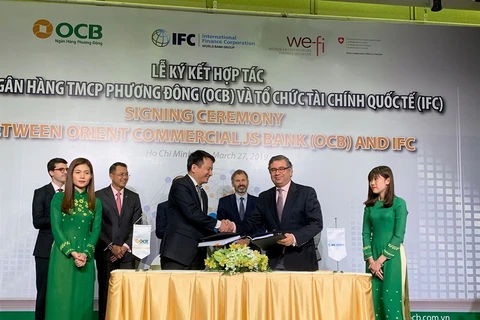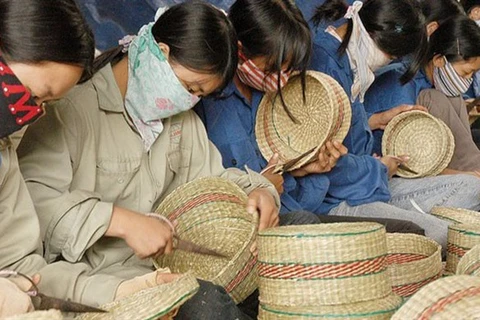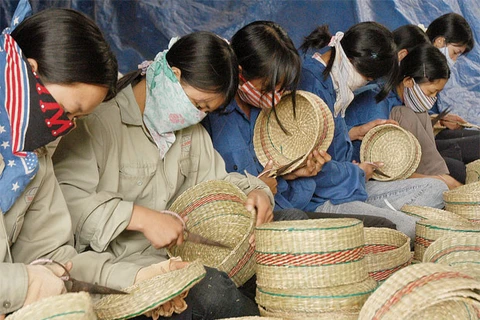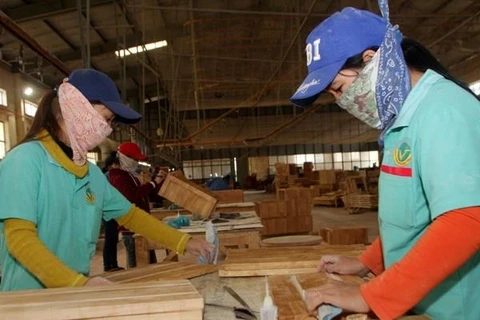Hanoi (VNA) - Business red tape in Vietnam was slashed last year, but up to 60 percent of small-and medium-sized enterprises (SMEs) said the change has failed to help them.
In 2018, business conditions in Vietnam were halved in line with Resolution No. 19/NQ-CP. Between 2015 and 2018, the domestic business environment jumped 21 places to reach 69th in the World Bank’s Business Environment Report.
[Vietnam’s top ten economic events in 2018]
Dr. Mac Quoc Anh, Vice Chairman and Secretary General of the Hanoi Small and Medium Enterprises Association (Hanoisme), spoke about this with VietnamPlus.
Time reduction
With the resolve of the Government and efforts of ministries, agencies and localities, Resolution No. 19 has been implemented, halving business conditions. What is your assessment of this success?
Dr. Mac Quoc Anh: In 2018, the reduction of business conditions met the expectations of enterprises. However, did the result satisfy the requirements set by the Prime Minister?
Vietnam aims to have 1 million businesses which operate in a rather improved environment by 2020. Generally, business conditions have been cut, meeting the targets set in Resolution No. 19. However, the work has only completed the quantity target. Bottlenecks remain in administrative procedures. For example, the time spent on processing administrative procedures has been shortened but administrative steps remain unchanged.
Many administrative procedures have not been streamlined as committed. Many others have been committed and implemented but the results fell short of expectations. For example, although the timing of the issuance of exhibition certificates has been cut from 30 to 15 days, the number of required steps has been kept unchanged.
The work should be stepped up to reach the target of “reducing business procedures and conditions.” The most concrete solution is to review and assess the realisation of Government resolutions on whether the reduction has really benefitted enterprises. Also, the Government should task ministries and agencies with specific targets in numbers. Central, provincial and municipal associations need to participate in inspecting the performance of ministries and agencies in this regard.
 Dr. Mac Quoc Anh - Vice Chairman and Secretary General of the Hanoi Small and Medium Enterprises Association. (Photo: Vietnam+)
Dr. Mac Quoc Anh - Vice Chairman and Secretary General of the Hanoi Small and Medium Enterprises Association. (Photo: Vietnam+)
New law concretises guidelines
The Law on Support for Small- and Medium-sized Enterprises has been in force for nearly a year. How has it impacted SMEs?
Dr. Mac Quoc Anh: The Law on Support for Small-and Medium-sized Enterprises has been materialised for 11 months.
Agencies and organisations have performed communication work well. However, the implementation of the law should be based on adjustments in accordance with many bilateral and multilateral commitments that Vietnam has made in the integration process.
Therefore, localities, concerned departments and business associations need to open training courses and organise programmes to equip businesses with information about conditions to benefit from the support set in the legal document.
Some localities have yet to implement the law, failing to make monthly and periodical reports and study impacts of the law on businesses. Vietnam has established many funds that support SMEs and innovations, along with credit guarantee funds, while taking solutions to deal with market issues. However, businesses still find it hard to access them.
Additionally, domestic businesses have not taken the initiative in studying legal documents the funds and solutions. They lack specific groups in charge of studying the law and conditions to benefit from support.
The law includes many terms and solution frameworks that aim to improve the accessibility of businesses. Among them are regulations guiding ministries and agencies to carry out trade promotion activities, and training institutions to support SMEs and startups. However, the regulations are still on paper, so ministries and agencies should take concrete measures to realise them.
The Government, cities and provinces need to maintain dialogue channels with businesses to get updated on problems in administrative procedures facing the business community. I think solutions to these difficulties should be taken thematically. Ministries and agencies with complex administrative procedures, such as the Ministries of Agriculture and Rural Development, Planning and Investment, Finance, Health and Construction, should hold dialogues with businesses within a month.
Businesses confident in market
At the end of 2018, one of the country’s notable achievements was the breakthrough development of the private sector. What do you think about this?
Dr. Mac Quoc Anh: The Resolution adopted at the 12th Party Central Committee’s fifth plenum set the target of turning the private economic sector into a major driver of the socialist-oriented market economy. This is one of the specific and detailed plans aiming to raise businesses’ confidence in the market.
Many prestigious financial and banking organisations have acknowledged the Vietnamese market’s potential. The country’s business environment has improved with streamlined administrative procedures compared with other nations in the Asia-Pacific region. Besides, financial solutions on macro-economic issues have helped to encourage enterprises to invest.
A highlight in 2018 was that the National Assembly approved a resolution ratifying the Comprehensive and Progressive Agreement for Trans-Pacific Partnership (CPTPP), enabling Vietnamese businesses to join the market of more than 600 million people. With the expanded market and favourable business conditions, local firms have better conditions to join the global value chain.
Vietnam’s agricultural production value is expected to reach 40 billion USD during 2019-2020, and agricultural products will drive national economic development. Currently, domestic agricultural products are mainly provided by the private sector. Therefore, this is a foundation for the Vietnamese economy to create breakthroughs.
SMEs contribute 40 percent of GDP
The national economy is forecast to grow nearly 7 percent in 2018. How do you evaluate the contributions of SMEs to this result?
Dr. Mac Quoc Anh: The outcome is in line with the National Assembly’s target and reflects the Government’s efforts in management.
Amidst the Fourth Industrial Revolution, ministries and agencies have focused on financial solutions in support of high-tech agriculture and garment-textile sectors, which are attracting many labourers.
SMES have contributed significantly to the national economy. They have employed nearly 60 percent of the country’s total labourers and contributed 25 percent of national export value in 2017 and 30 percent in 2018, and more than 40 percent of the national gross domestic product (GDP). Therefore, I believe that SMEs will make more contributions to and spur the economy, helping to completing the target of maintaining economic growth at 7 percent in 2019.
What do you expect from the Government’s administration as well as the business environment in 2019?
Dr. Mac Quoc Anh: With the management of the Government and the participation of different socio-economic sectors in inspections, the quality of the reforms of administrative procedures and business conditions will improve, helping create a favourable business environment and attract more investment.
Another 20 percent of business conditions are set to be cut in 2019. With the eased administrative burden, enterprises will focus resources on other fields like markets, research and training.
Through joining the CPTPP, Vietnam hopes to set up more joint ventures and cooperative ties to bring its products to strict markets.
Another spotlight is high-quality human resources. Recent forums show the domestic market is attracting external resources, especially overseas Vietnamese intellectuals and businesspeople. Vietnam, therefore, will have more resources for innovations during the Fourth Industrial Revolution, and the country’s science-technology and products will be more competitive and develop sustainably.-VNA
























